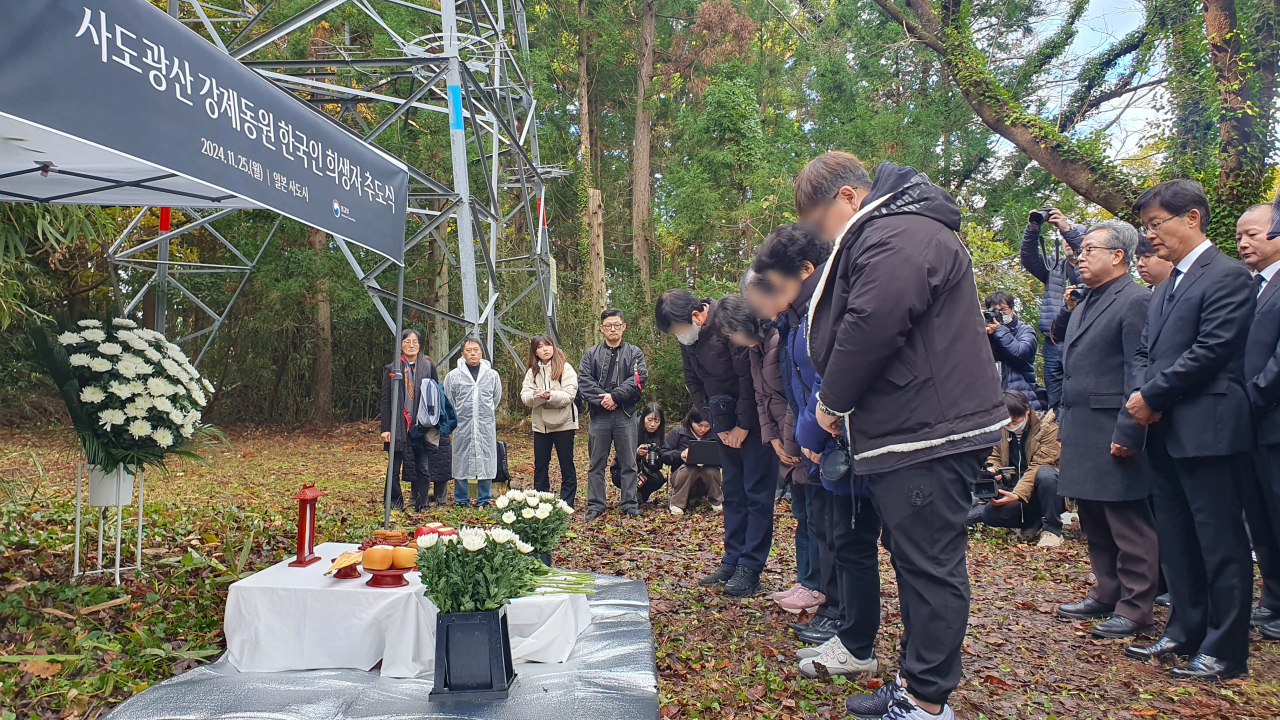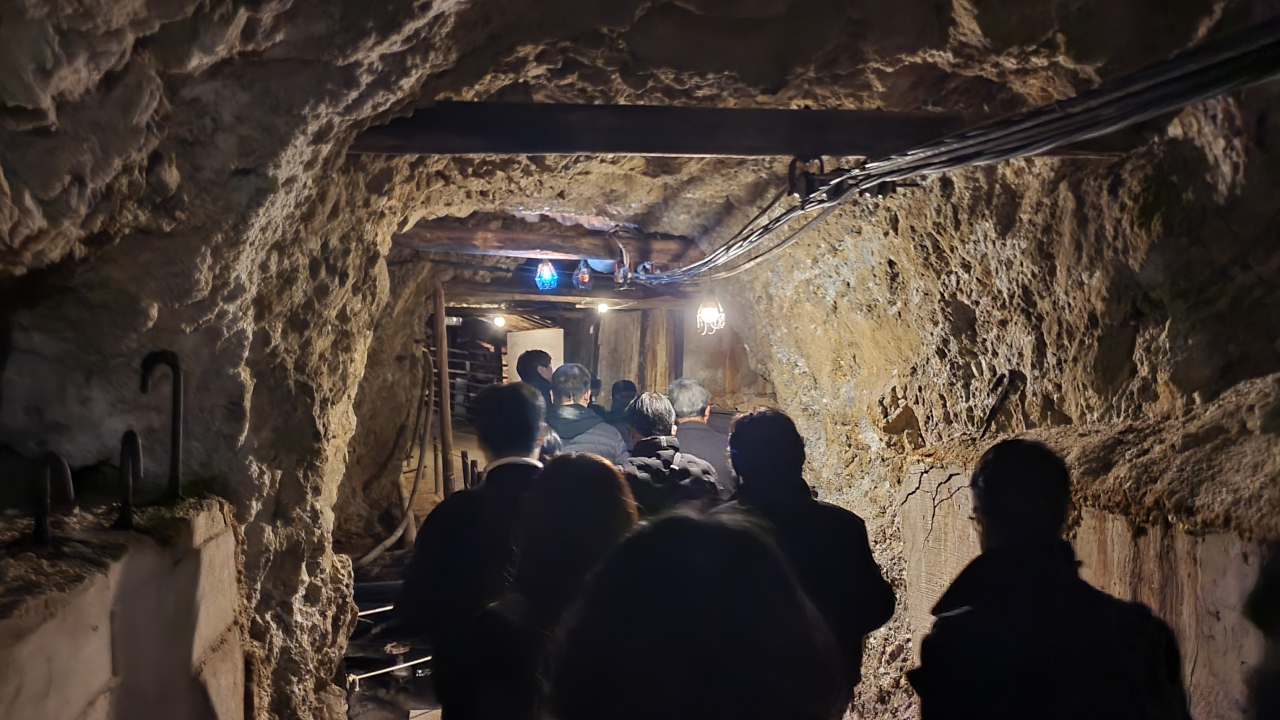Korea’s memorial recalls plight of forced mine workers amid Japan’s silence
Criticism mounts over Seoul’s diplomacy amid feud with Japan over memorial ceremony
Published : 2024-11-25 15:29:04

The South Korean government on Monday held a memorial to honor the lives and suffering of Korean forced laborers who endured harsh conditions at Sado Island’s gold mines during Japan’s 1910-1945 colonial rule, as relatives of the deceased gathered at the former dormitory where the workers once lived.
The decision followed Seoul’s boycott of a Japan-hosted ceremony a day earlier, where Japanese government representative Akiko Ikuina -- who has in the past visited the controversial Yasukuni Shrine on Korea’s Aug. 15 Liberation Day -- neither addressed the forced mobilization of Korean workers nor offered an apology in her remarks.
"We bow our heads in deep condolence and solemnly pay tribute to the souls of the Korean workers who were forcibly mobilized to the Sado mines over 80 years ago, where they were worn down by harsh labor and tragically perished," South Korean Ambassador to Japan Park Cheol-hee said in his memorial address during the event hosted by South Korea's Foreign Ministry. "May they rest in peace."
The Memorial Ceremony for Korean Victims of Forced Labor at Sado Mines, held at the former Fourth Souai Dormitory site on Sado Island, unfolded in a solemn atmosphere. The event included memorial addresses, a moment of silence, and a flower-laying tribute, attended by nine South Korean relatives of the deceased and government officials.
"Both Korea and Japan must earnestly work together to ensure that the painful history from over 80 years ago continues to be remembered," Park underscored.
Park highlighted the plight of Koreans forced to toil deep underground in mines, enduring suffocating heat and clouds of stone dust, while isolated on the remote Sado Island, over 800 kilometers from their homeland, and unable to communicate due to language barriers.
"We don't even dare to imagine how many nights they must have endured, longing for their beloved families and homeland, struggling to keep alive the flame of hope that they would one day return," Park said.
"The sorrowful hearts of the Korean workers who passed away without ever setting foot on their homeland again or reuniting with their beloved families, as well as those who returned after liberation but still had to endure difficult lives due to their lingering injuries and pneumoconiosis, cannot be fully comforted by any words."
Seoul’s abrupt decision on Saturday afternoon to hold its own memorial marked a sharp U-turn from its initial plan to participate in Japan’s memorial ceremony on Sunday.
The reversal came amid mounting criticism over the appropriateness of Ikuina, a parliamentary vice minister at Japan’s Foreign Ministry, serving as the chief government delegate for the event.
At the heart of the controversy lies Ikuina’s history of visiting the contentious Yasukuni Shrine -- which Seoul condemns as glorifying Japan’s wartime aggression and honoring war criminals -- on Aug. 15, 2022, the anniversary of Japan’s World War II defeat and South Korea’s liberation from Japanese colonial rule.
Japan’s choice of chief delegate was particularly sensitive given the historical context, as the Japanese government had pledged to hold annual memorial events honoring “all the workers at the Sado Island Gold Mines” in exchange for securing South Korea’s consent for the site’s inscription on the UNESCO World Cultural Heritage list this July.
More than 1,500 Koreans were forced to work at the Sado complex of mines under harsh conditions and without proper compensation toward the end of Japanese colonial rule, according to a joint report in 2022 by the Korean Center for Historical Truth and Justice in Seoul and the Network for Research on Forced Labor Mobilization in Kobe.
Japan’s acknowledgment of forced labor is crucial, as it had long restricted the official narrative of Sado mines' history to the Edo period from 1603 to 1867, deliberately excluding the entire era of Japan’s occupation of Korea from 1910 to 1945.

The Foreign Ministry in Seoul said holding its own memorial ceremony is a "clear expression of our government’s unwavering resolve not to compromise with Japan on historical issues" in a statement issued on Sunday evening.
"Based on this principle, we intend to continue striving for the development of bilateral relations in a way that serves the interests of both Korea and Japan."
However, even the ruling People Power Party urged South Korea’s Foreign Ministry to reassess whether its complacent approach to the highly sensitive memorial event allowed Japan to sideline South Korea’s key demands for an accurate reflection of history.
"It is regrettable that our government’s demands were not adequately reflected in the Sado Mine memorial ceremony, despite its significance as a sensitive issue between Korea and Japan," People Power Party floor leader Choo Kyung-ho said Monday. "There is also a need for humble reflection and a review to determine whether this outcome was due to complacency on the part of our diplomatic authorities."
Lee Jae-myung, chairman of the main opposition Democratic Party of Korea, on Monday denounced the Foreign Ministry's "subservient, giveaway diplomacy."
"As we approach the 60th anniversary of Korea-Japan diplomatic normalization, I must emphasize that a future-oriented and normal Korea-Japan relationship will remain unattainable if Japan continues to distort history and the Korean government persists in its humiliating diplomacy that aligns with such actions."
http://www.koreaherald.com/common/newsprint.php?ud=20241125050061